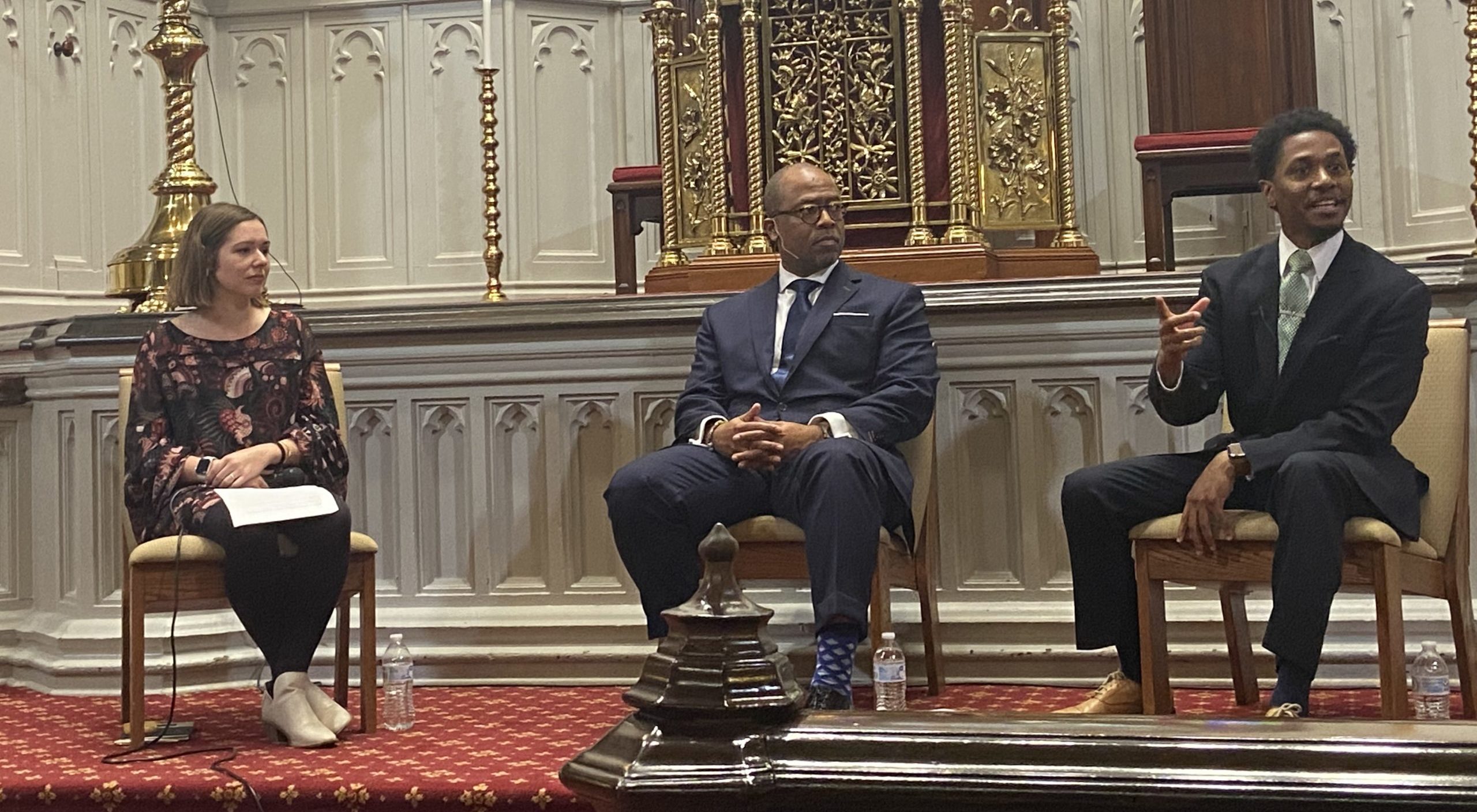Responding to Christian nationalism with reconciliation
The Rev. Dr. Jay Augustine speaks at Freemason Street Baptist Church in Norfolk, Virginia.

By Elizabeth Tadlock, BJC intern
What is the role of prophetic leadership, the church and the act of reconciliation in combating the rise of Christian nationalism? The Rev. Dr. Jonathan C. “Jay” Augustine shared his understanding of reconciliation during a panel discussion alongside BJC Director of Education Charles Watson Jr.
“Reconciliation for me, as a ministry that Jesus left the church, is really twofold because Jesus came not just to save lives but came to usher in a reign of equality for all of God’s children,” said Dr. Augustine, an author who serves as pastor of St. Joseph AME Church in Durham, North Carolina. He also delivered BJC’s 2022 Shurden Lectures.
The panel discussion, titled “Responding with Reconciliation: Prophetic Leadership and Christian Nationalism,” was held at Freemason Street Baptist Church in Norfolk, Virginia, on Nov. 13. The event was moderated by the Rev. Caitlin Childers Brown, associate pastor at Freemason Street and a member of the 2022 class of BJC Fellows.
Watson explained how Christian nationalism is not a new narrative, but it is a narrative that has been strengthened over time by historical events and doctrine.
When asked about the role that race plays in Christian nationalism, Dr. Augustine discussed how “white” has maintained dominance in the social and economic structures of America because of a doctrine that “put certain people over another.” Watson added that “the power structure of white supremacy can be on a face that is not white” because of the “power structure that America has pushed.”
Both panelists emphasized the role of the January 6 insurrection and how this event can be considered an example of people defending power structures that put certain groups of people over others.
“We want America to reach her full potential … and we came dangerously close to everything going wrong on January 6,” Dr. Augustine said.
Dr. Augustine used gumbo as a metaphor to explain how, unlike the traditional metaphor of the melting pot which requires groups of people to erase parts of their unique identity, gumbo allows each American who comes to be a part of this “gumbo” to “compliment one another in their diversity” and keep their personal and familial identity.
The Rev. Brown asked Dr. Augustine what he thought about the “evangelical push favoring Christian nationalism.”
“I do think that there is a movement going forward because of the extremity of the Make America Great Again narrative. I think people are no longer going to just toe the party line. I think you have a lot of people who are going to question and a lot of people who will move toward the center, politically and religiously, [instead of] being on the far-right fringe.”
Watson added that, because of their focus on evangelism, white evangelicals “should be the first ones to want religious freedom.” He said, “If you don’t have religious freedom, you can’t convert.”
The Rev. Brown asked both Dr. Augustine and Watson what prophetic leadership looked like in the face of Christian nationalism, what role the church can play in reconciliation, and what the audience could do to take action.
“Educate more people about the role of prophetic leadership,” Dr. Augustine said, emphasizing that prophetic leadership looks like “speaking truth to power or speaking truth to institutions of power.” When you educate people on prophetic leadership, Dr. Augustine said that “people of the church will become contemporary prophets and speak out against the norms of Christian nationalism and people that want to make us a ‘Christian nation.’”
Watson added that this prophetic leadership does not have to be just from the pulpit or even the pew. “Some of the prophets that I see are speaking truth to power, and some of them don’t reside in the pulpit or pew. Truth is truth, no matter where it comes from, and so it should be listened to in that way.”
Dr. Augustine examined 2 Corinthians 5 and the idea that reconciliation is a ministry that Jesus left to the church.
“Paul writes about this in very emphatic terms, in very impassioned terms,” Dr. Augustine said. “So, we, as Christians, as followers of Christ, should be Christ-like and I think should carry the mantle [of reconciliation].”
You can watch their entire conversation on the church’s Facebook page at Facebook.com/Freemasonstreet.
This article first appeared in the winter 2022 edition of Report from the Capital. You can download it as a PDF or read a digital flip-through edition.




